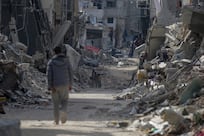ISTANBUL // Turkey and Iran were not likely to mount joint military operations against Kurdish rebels despite the two countries' agreement to do so, analysts have said.
Tehran was more concerned about Turkey's policy choices in key regional issues than about the rebels, they claimed.
Both countries have had to deal with Kurdish rebels operating from a mountain hideout in northern Iraq but the problem is much larger in Turkey, where tens of thousands of people have died in the 27 years since the Kurdistan Workers' Party (PKK) took up arms for Kurdish self-rule in 1984.
The PKK's Iranian wing, the Party of Free Life of Kurdistan (Pjak), has been the target of Iranian military action in the past but declared a ceasefire last month.
Last week, Turkey and Iran vowed to collaborate in their fight against the rebels.
The announcement came as the Turkish military staged a broad offensive against the PKK in south-eastern Turkey and in northern Iraq after PKK fighters killed 24 soldiers in south-eastern Turkey earlier this month.
About 250 PKK fighters have been killed in the operation that ended on Thursday, according to the Turkish general staff.
After a meeting with his Iranian counterpart, Ali Akbar Salehi, last week, Ahmet Davutoglu, Turkey's foreign minister, said that Turkey and Iran would cooperate "in a joint action plan until this terrorist threat is totally eliminated".
Mr Salehi said the PKK and Pjak were "common problems" for both countries. "We need to cooperate more seriously against them," he added.
No details of the cooperation agreement were made public.
Oytun Orhan, a specialist on Iran at the Centre for Middle Eastern Strategic Studies (Orsam), a think tank in Ankara, said Turkey's long-standing wish to stage joint military operations with Iran to tackle the PKK and the Pjak was unlikely to be fulfilled.
"We do not know what the agreement says," Mr Orhan said on Thursday. But given Iran's grievances with Turkey's policies in the region, it was hard to see any readiness in Tehran to do Ankara a favour by vigorously tackling the PKK and the Pjak, he added. "It is unlikely that Iran will undertake practical steps. Why should it?"
General Necdet Ozel, Turkey's chief of general staff, confirmed that joint Turkish-Iranian action against the PKK and the Pjak were not on the agenda.
The rebel leadership had been hiding in northern Iraq's Qandil Mountains, near the Iran border and about 100 kilometres south of the border with Turkey.
Gen Ozel played down the significance of military cooperation between Ankara and Tehran.
He told the Turkish news channel NTV this week that Turkey was sharing intelligence with Iran "because this country is our neighbour". But "at the moment, a joint operation is out of the question".
Gen Ozel praised Turkey's intelligence cooperation with the US in the fight against the PKK as an exercise of "joint interests and sensitivities".
Both countries were trying to increase that cooperation to make it more efficient and to produce "more tangible results".
The US provides Turkey with intelligence data about the movement of suspected PKK militants in northern Iraq.
Mr Orhan, the Orsam analyst, said relations between Iran and Turkey were at their lowest point for years.
Iran criticised Turkey's decision to have parts of the Nato missile shield installed on Turkish territory. Tehran also voiced concern about Turkey's support for the opposition of the regime in Syria, a key Iranian ally, and about Ankara's promotion of the Turkish version of a secular republic as a model for Arab Spring countries, Mr Orhan added.
"The most Turkey can hope for is that Iran stays passive when it comes to the PKK," he said.
Recep Tayyip Erdogan, the Turkish prime minister, last week accused outside forces of supporting the PKK, in remarks widely interpreted to be aimed at Syria and possibly Iran.
Mr Orhan said Pjak was not a big priority for Iran but the situation in Syria was "an existential issue" for Tehran.
A possible fall of the regime of Bashar Al Assad, the Syrian president, would increase Iran's isolation in the region and cut direct links between Tehran and its ally in Lebanon, Hizbollah.
Besides reaching out to Iran and strengthened its cooperation with the US, Turkey has increased cooperation with the Iraqi government and the Kurds ruling northern Iraq in a bid to weaken the PKK.
Turkey's cooperation with the US irked Tehran. After his meeting with Mr Davutoglu last week, Mr Salehi accused Washington of withholding information from the Turks. He said the PKK attack that killed the 24 Turkish soldiers might have been avoided if the US had told Turkey the rebels were infiltrating with heavy weaponry.




